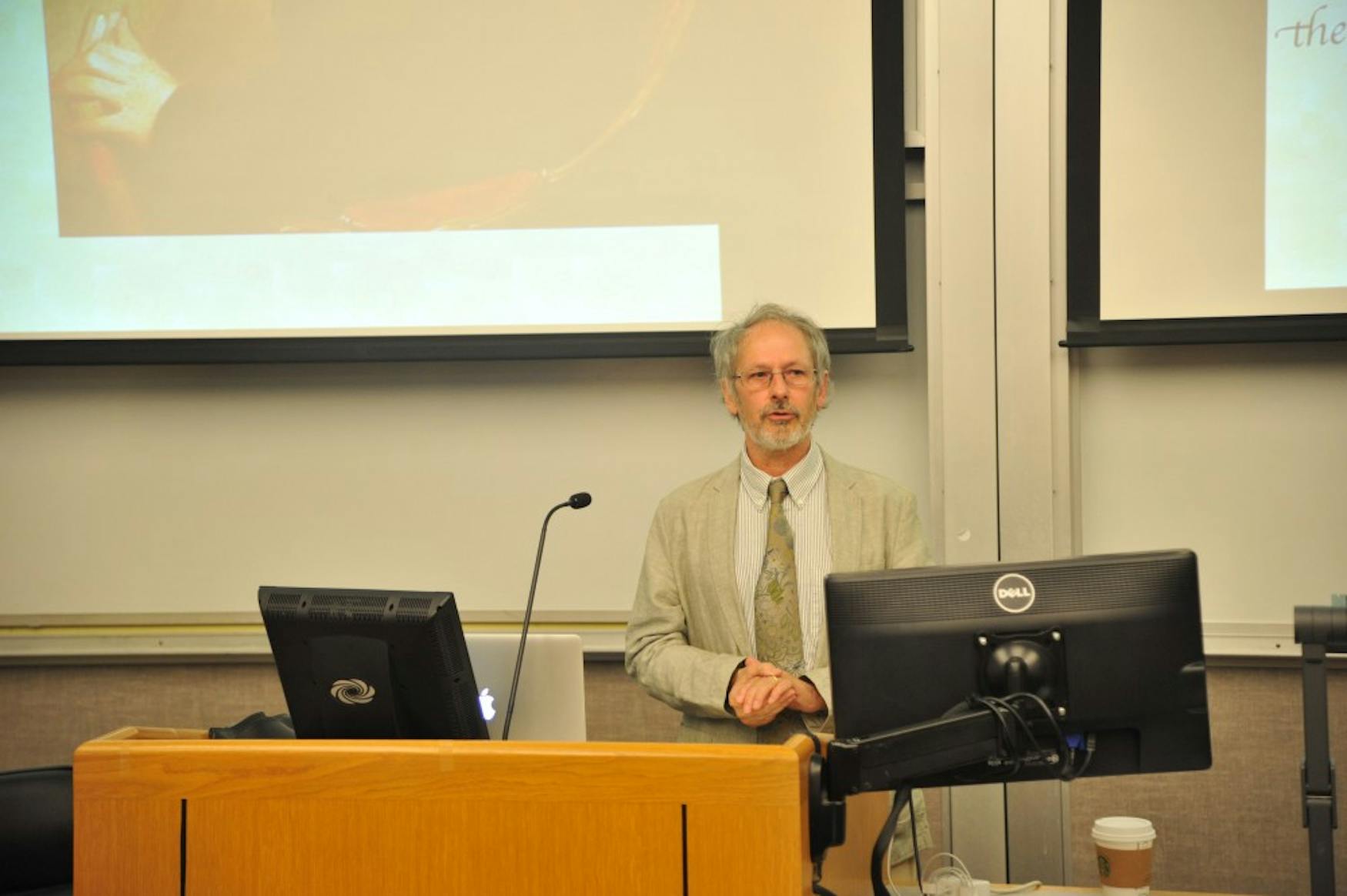Scholar discusses effect of sea travel on colonial society
On Thursday, Dane A. Morrison spoke on the importance of sea travel, particularly to Asia, for early colonial Americans in a lecture titled, “True Yankee: The South Sea and American Identity.” This is also the title of his most recent book, published in 2014. Morrison is an American history professor at Salem State University.
Prof. Thomas Doherty (AMST) introduced Morrison by saying his new book demonstrated “how that other frontier … shifted the American identity.” He highlighted that “part of the American economy, the role of this distant sea trade in developing the nation’s character and global outlook in the early national period, has not been discussed until now.”
Morrison started his lecture by stating that his book is a discovery of “Americans’ first encounter with a wider world, how they came to understand its character and paradoxically came to understand who they were.” He said that “on another level, this is a book about print culture. [It] tries to cover the voices of men and women who sailed from a new nation, who were called the new people and who themselves feel that they were encountering, ironically, a new world.”
Even though the Americans had defeated the British in the Revolutionary War, Morrison argued that they were still thought of as “barbarians” in most of Europe. Therefore, he stated, Americans of the time “[found] that they have another battle to fight. It is not military. It’s cultural.” He added that, “among different issues, there was one standing out of all others — we have a national form, [and] we must deserve respect as people.”
Excluded by Europe, Americans turned eyes to China, a major driver in the global trade economy in the 1600s. Samuel Shaw, among the five American travelers detailed in Morrison’s book, was one of the first Americans to sail to China. Morrison noted that Shaw differed from his shipmates in that he focused on foreign culture as a priority. Sailing on a cargo ship, Shaw thought he was “carrying the value of a free republic to the rest of the world,” Morrison said.
Shaw’s journals detail his journeys through new and exciting places; for Shaw, Morrison argued, China “is not just a new country, but a new world.” Amazed by the diversity of people and dense population in Canton, Shaw felt strongly that Americans “must be taught what the world is really like” outside of the continental United States. Shaw even argued that “we should recognize this [first entry date to China] as the second national holiday,” Morrison noted.
Morrison claimed that Shaw fit the definition of a “true Yankee” as someone who was “accepted by a community of civilization.” He added that for Shaw, the easy entrance and welcome into China’s trading ports signified that “in the far side of the world, Americans are accepted. ‘This is our turning point. We have accomplished our goal — we have earned national respect [after gaining independence from Britain].’”
The second traveler Morrison discussed, Amasa Delano from Massachusetts, was also an explorer and sea trader who sailed across the Indian and Pacific Oceans. In his books, “A Narrative of Voyage and Travels in the Northern and Southern Hemispheres,” Delano defined a “true Yankee” as a citizen of the world. Morrison noted that Americans “were no longer local. They traveled everywhere. ... To be truly civilized, to be truly cultural, a people should be educated. For Delano, travel educates us, and makes us sophisticated, make us cosmopolitic[al], make us polished, [and] in his language, makes us a citizen of the world.”
One experience stands out from Delano’s narratives, Morrison said. On his travels to Chile, he saved the captain from a riotous slave ship, the Tryl. The slaves were then executed by the local Spanish authority in Chile, and Delano was rewarded by the Spanish king. According to Morrison, even though Delano describes a ‘true Yankee’ as a republican liberator and rescuer, “America is a republican liberator until they get to people of different color, different race. He [Delano] is instrumental in sending back into slavery and two executions, a couple of hundred people, who had been [of a] different color. He simply wrote in a paper, ignored the executions, that this is what an American should do in the world.”
The lecture then transitioned to a question-and-answer session. Tzvi Miller ’16 asked Morrison why his examples of the American vernacular of the late 1600s were not reflected in literature like Cotton Mather’s narratives. Morrison responded that most of the vernacular he used would be found more intensively in travelers’ logs. He added that “Americans [who] traveled en masse around the world … spent time to understand what these words mean.” Abby Patkin ’18 asked why narratives like Delano’s and Shaw’s lost popularity over time. Morrison replied that the frontier Americans were interested in had shifted, as “14 million population lived in [the] east coast and traveled [to] the west [in the U.S]. … You see reference of India, China and Sumatra filling in the newspaper in the 17th century. Then, you find a number of references of Asia dropped off in the 18th century. They are more interested in reading or just publishing accounts of pioneers and events in the Western world.” The last question came from a professor, who asked if Americans felt a racial superiority in their early visits to China. Morrison stated, “In the decades following the revolution, there was a sense among most of these travelers that they have something to prove. They feel they are equal to British, Spanish, and France. They are part of community of civilization. If there are communities of civilization, there must be communities of uncivilized nations.”
—Editor’s Note: Abby Patkin ’18 is the News Editor of the Justice.



Please note All comments are eligible for publication in The Justice.